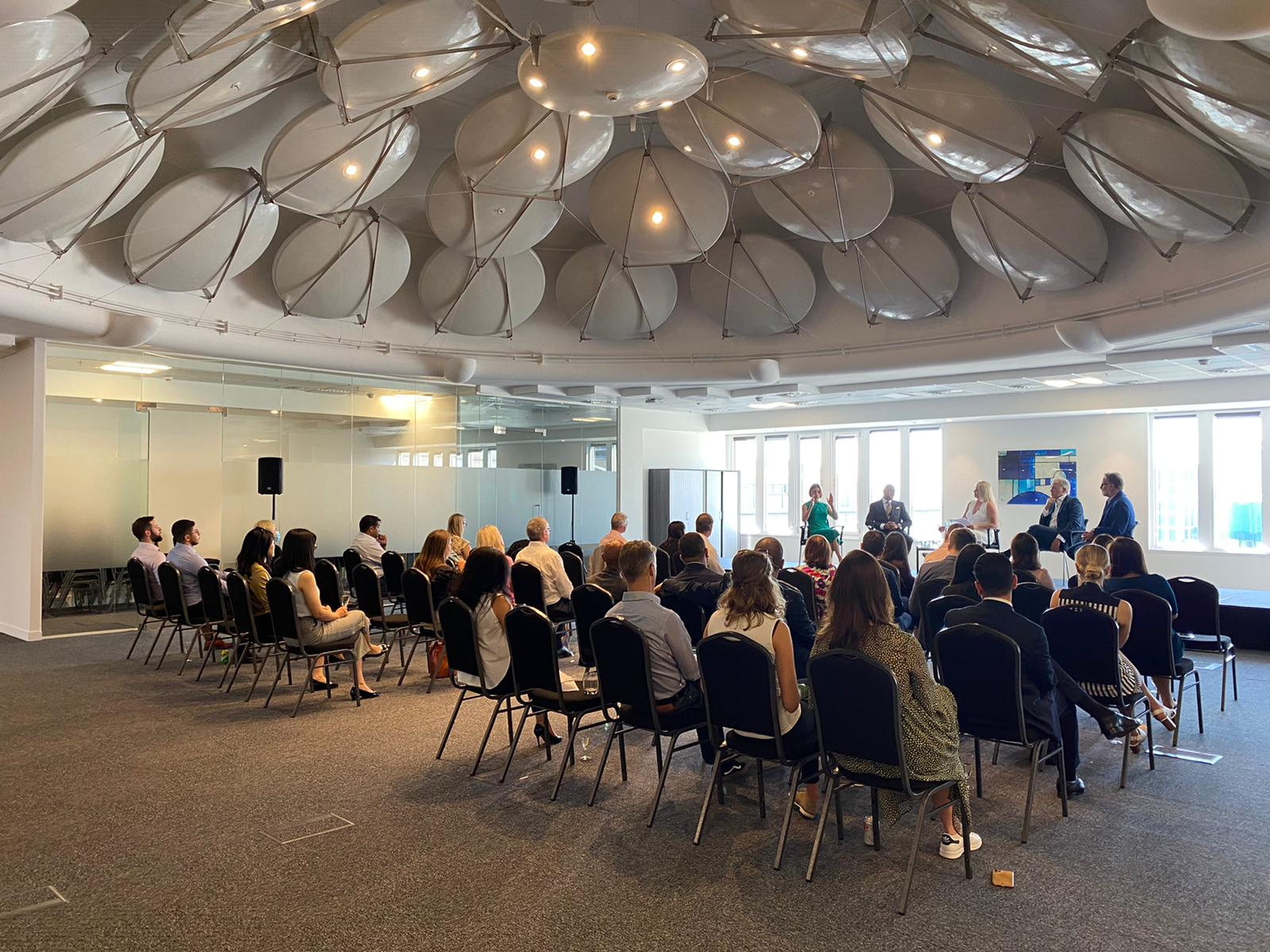Proactive Property Management for a Hybrid-Working World
The current challenge for property managers is to devise creative solutions that mean buildings remain inviting, without wasting valuable resources, Eleanor Newton,...
Read Full Article
Adapting to remote working, becoming comfortable with disruptive technologies and creating a friction-free workplace were all on the agenda at flexible office space provider Landmark's panel event.
Held at flagship Landmark property Beaufort House, Aldgate the panel included: Alison Conway, Group Head of Strategic Development at Trust Payments; Rafaat Rahmani, Founder and President of Lifescience Dynamics; Paul Russell, Digital Transformation Coach and Founder of Evenifitwasfree; and David Kinnaird, CCO of Essensys.
The event was emceed by Katie King MBA, an Artificial Intelligence in business consultant and published author.
ThisWeekinFM was in attendance, along with Landmark's clients and other members of the press. Here's a glimpse of what we learned about the future of work:
Not being scared of change or new technology was one of the key messages highlighted by Emcee Katie King, who urged us all to instead be reassured by it, and open to new, easier ways of working:
“Whatever level you are at in your company or your career, you have to keep adapting. Don’t be frightened of technology and of change. We are all learning as we go along; we adapted to COVID and we must continuously adjust to new technologies.
"Don’t have imposter syndrome. We are all on a journey and it’s about mindset. It’s about being open to change, bringing your teams with you. We have no choice because we cannot afford to ignore technology like AI anymore.”
For Rafaat Rahmani, Founder and President of Lifescience Dynamics, he was aware of maintaining as much normalcy as possible for all of Lifescience Dynamics’ teams across the US and UK during the lockdown.
Being an early adopter of cloud computing and other online platforms helped keep these teams connected to one another during the lockdowns. Also, alleviating some of the pandemic’s biggest stress factors surrounding financial security, training, and career progression proved successful in maintaining morale and keeping the family culture intact.
Rafaat said: “As a compassionate and human company, we did not put anybody on furlough and we did not freeze any spending. We did not stop any promotions for anyone who deserved one. That inevitably led to some challenges with Finance and HR, but it was the right thing to do. Before the pandemic, we met three times per year as a company. It’s things like that that allow us to have that family feel and sense of community as a human company. That enabled us to develop our own customs, rituals, traditions and culture. That is a definite challenge with remote working.”

Picture: a photograph showing the panel on stage and the audience
The idea of learning as you go and sharing the journey with the team was echoed by both Rafaat and Alison Conway, Group Head of Strategic Development at Trust Payments.
Both were able to provide first-hand insight into their organisations’ challenges since the pandemic began. They also shared their plans to direct their companies moving forward. Amazingly, both companies grew their teams during the pandemic, and adopted a people-centric approach to maintain their existing workforce while welcoming new hires into the fold.
“I think one of the key successes for us has been maintaining a degree of humility. Saying, ‘Look, we’re all in this together. We don’t know what it’s going to look like. We don’t have all the answers, but here’s our initial plan and what we’re going to be doing.' We make sure we regularly touch base. We have an open environment, and we ask questions.”
–Alison Conway
Group Head of Strategic Development, Trust Payments
For Conway and her team at Trust Payments, the key was to embrace the unknown and to engage teams with openness and honesty.
“I think one of the key successes for us has been maintaining a degree of humility. Saying, ‘Look, we’re all in this together. We don’t know what it’s going to look like. We don’t have all the answers, but here’s our initial plan and what we’re going to be doing.' We make sure we regularly touch base. We have an open environment, and we ask questions.”
Both Alison and Rafaat expressed a desire to have their people back in the office, at least part-time. For Alison, the original plan was to stay remote after seeing how successful this approach was during the pandemic. But as time wore on, the team began to miss the type of comradery Rafaat described within his own organisation.
At Lifescience Dynamics, the safety of staff is the top priority. Therefore, working from the office is encourage when safe to do so, but a hybrid model is in place. Trust Payments has also gradually shifted towards a hybrid model for their team.
A point raised by Alison was the access to a whole new cohort of talent afforded by hybrid working. She said: "It's opened up our recruitment doors to a broader talent base because of hybrid working".
In terms of onboarding these new starters, Alison found challenges in helping people to understand the company's values remotely. But she cited that the communication of the HR team had made this easier, along with virtual coffees mixing up teams.
As the tech experts on the panel, both Paul Russell, Digital Transformation Coach and Founder of Evenifitwasfree; and David Kinnaird, CCO of Essensys, agreed that remote working will be here to stay at least in some form. However, new tools such as AI, video conferencing, and VR may end up providing a solution instead of worsening the problem.
Paul shared his vision that technology’s impacts in the workspace arena will play out sooner rather than later. “This is the time to really understand it. If we leave it too long, we will probably flip back. When we understand that, the role of technology can really make a difference.”
Getting started with our adjustment to advanced tools such as machine learning might be easier than we think. In fact, Paul thinks we already have a strong starting point in our pockets thanks to the smartphone. Our reliance on this piece of tech has grown stronger throughout the pandemic as we now are even more reliant on our phones for everything from proof of vaccination, keeping in touch with family and news feeds. In the workplace, we should expect to see that reliance carry over as we begin using our phones more readily, which in turn will make these devices the perfect segue into more advanced tools.
David agreed that we have grown accustomed to the convenience of tech, becoming more comfortable with doing things like seeing our doctor, conducting our weekly shop, and getting an education remotely via our phones and devices. He feels that we have come too far to turn back now: “Some things which are easier, more convenient, and work well remotely are going to stay doing that. Obviously, the pandemic has just accelerated things that were happening anyway.”
To hear more from the panellists, check out the highlight video from the event here. To explore Landmark’s flexible workspace, visit https://www.landmarkspace.co.
Picture: a photograph from Landmark's roof terrace at Beaufort House, Aldgate
Article written by Ella Tansley | Published 21 September 2021
The current challenge for property managers is to devise creative solutions that mean buildings remain inviting, without wasting valuable resources, Eleanor Newton,...
Read Full ArticleEmployee engagement is now the top priority for global businesses and nearly two-thirds are investing in their offices, according to a new global survey by ISS. The...
Read Full ArticleFor anyone still in doubt: flexible working is the future, not a fad, says Karl Breeze from Matrix Booking. In this opinion piece, Karl lays out his recommendations...
Read Full ArticleCabinet minister Jacob Rees-Mogg, in a letter to cabinet colleagues, is urging civil servants to reduce how much time they spend working from home. In a letter...
Read Full ArticleEmployees in England are no longer being asked to work from home, as the government removes Plan B rules. But is this change as simple as encouraging a mass return to the...
Read Full Articlex+why has announced its certification as a B Corporation, joining a growing group of companies reinventing business by pursuing purpose as well as profit. x+why...
Read Full ArticlePsychotherapist Noam Sagi explores how facilities managers can better respond to a post-pandemic workforce. Noam Sagi is a Psychotherapist, Change...
Read Full ArticleDuring initial national lockdowns, co-working companies incurred losses along with several other businesses, but what’s the future of these flexible...
Read Full ArticleThe IFMA Foundation has launched a preview chapter of “Work on the Move 3: Building Better Workplaces After the Pandemic”, a follow-up book on integrated...
Read Full ArticleMore than a third of US and UK office workers describe the prospect of going back to the office as the equivalent of going out to meet with friends, according to a...
Read Full Article